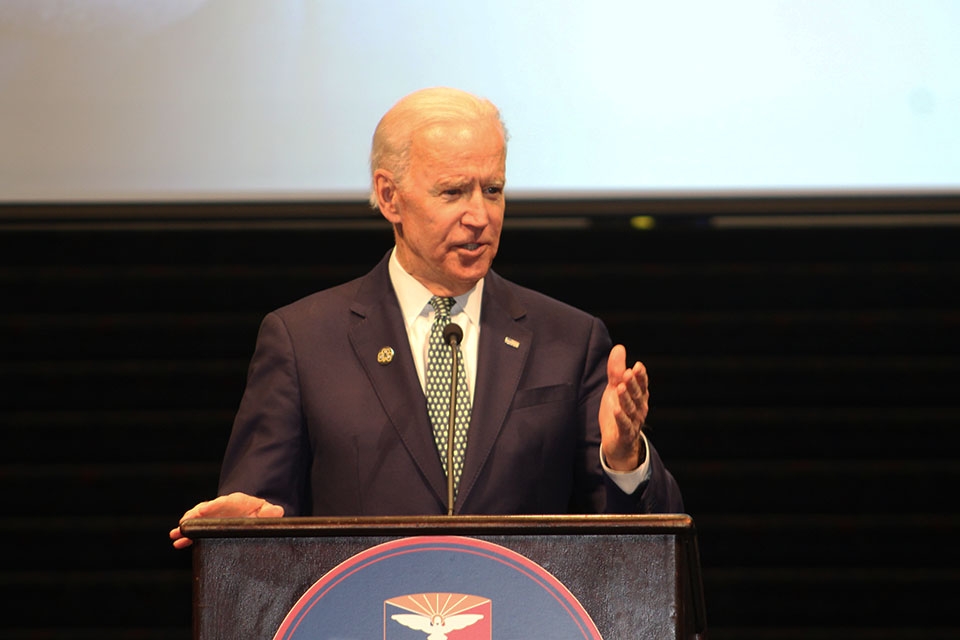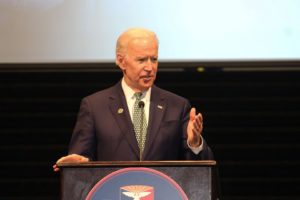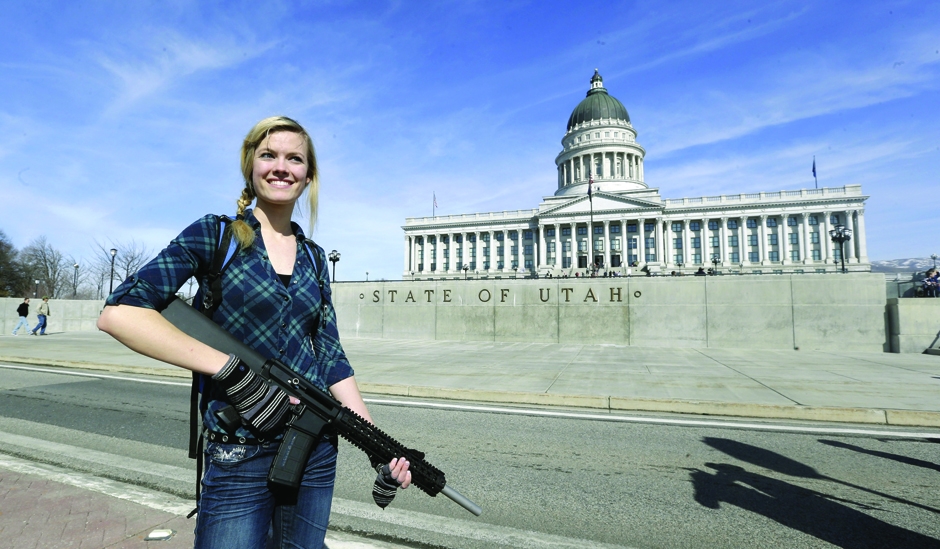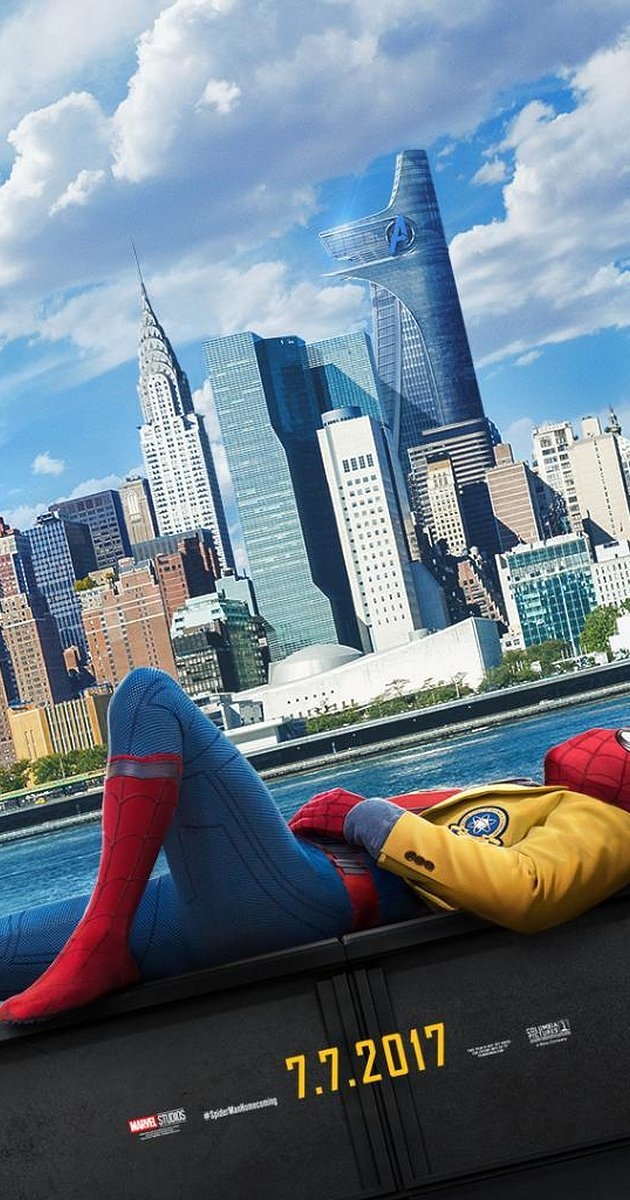
Former Vice President Joe Biden spoke of Rooney’s humility and faith as part of a symposium honoring the DU grad.

Former Vice President Joe Biden spoke of Rooney’s humility and faith as part of a symposium honoring the DU grad.
Raymond Arke | News Editor
03/22/18
“I can’t help but think Dan would insist we were making too much of a fuss.” This line, delivered by former Vice President Joe Biden, was one of many that honored the memory of Dan Rooney at “Sláinte! A Symposium Celebrating the Life and Legacy of Daniel M. Rooney” on March 16.
Rooney was a 1955 Duquesne graduate and would go on to become the president and chairman of the Pittsburgh Steelers. He also was involved in philanthropic work for Ireland and was appointed the U.S. Ambassador to Ireland from 2009 to 2012.
The symposium attracted a large crowd and featured panels of Steelers players, sports journalists and Irish members of Rooney’s Ireland Fund organization, among others.
The keynote speech was delivered by Biden, who was vice president when Rooney was ambassador. The former vice president was welcomed to the Union Ballroom with two standing ovations. He first spoke to Patricia Rooney, Dan’s wife.
“Pat, they love you in Ireland,” he said and quoted George Bernard Shaw, “Your husband’s imagination was as big as his heart.”
Biden said Rooney reminded him of his own father, a man who “abhorred the abuse of power.”
“My father said the cardinal sin of all sins was for a man to raise a hand against a woman … [He believed] everyone is entitled to be treated with dignity” ideals that Rooney shared, Biden said.
Biden also commented on Rooney’s humility.
“[Rooney] was the kind of guy who stood in line at the stadium to buy a hot dog, even though he owned the whole damn team,” he said. “He’s not a guy to ever brag about his accomplishments.”
Biden recounted his personal interactions with the Rooneys, which involved the 1972 car accident that killed Biden’s first wife and daughter and injured his two sons. While his sons were in a Wilmington, Delaware, hospital, Biden left for the first time for two hours to get a plastic Christmas tree. And when he returned, something was different.
“[My sons] were smiling for the first time. They had footballs on their chests, and the whole Steel Curtain had signed them,” Biden said. “The first glimmer of hope I had.”
Biden was surprised to hear Art Rooney, Dan’s father, had dropped by to deliver the balls and then quickly left with no publicity.
He said that Dan Rooney exemplified the city of Pittsburgh as it went through the end of steel.
“He was always about hope, about getting back up,” Biden said. “He pursued the future he hoped to see.”
Biden also recounted the efforts Rooney made to bring peace to Ireland, both as ambassador and prior to the appointment.
“Dan was an ambassador long before President Obama, and I asked him to do it,” Biden said. “He threw himself into it with great enthusiasm.”
Finally, Biden made one last connection to Ireland that summed up Rooney’s approach to the world.
“We Irish are the only people in the world who are nostalgic about the future,” he said.
The symposium had opened that morning with remarks from Duquesne President Ken Gormley, who said Rooney was “one of my personal heroes.”
“[Rooney] reflected his deep love and respect for his alma mater,” Gormley said.
The first panel was titled “Dan Rooney: Faith, Family and Pittsburgh” and featured Andrew Masich, President and CEO of the Sen. John Heinz History Center, as the moderator. The panel consisted of John Canning, a local historian known as “the dean of North Side history;” Patricia Rooney Gerrero, daughter of Dan; David Halaas, a historian who co-wrote Rooney’s autobiography; Gen. Michael Hayden, the former director of the NSA and CIA and a longtime North Side resident; and Reverand Paul Taylor, executive vice president of St. Vincent College where the Steelers hold training camp.
Patricia Rooney recalled her father as “amazing” growing up.
“[He] had tons of energy … more than us,” she said.
She recalled when the Steelers had training camp in Rhode Island. As the smallest child, she would be stuck riding in between footballs and helmets in the minivan her father drove. The trips were “a wonderful, fun thing,” she said.
Taylor recalled Rooney’s insistence on wearing his black priest habit when Taylor would visit the Steelers’ training camp.
“I’d like you to wear your habit … [The fans] see these great players talking to a priest, and then it’s ok to be religious. It’s ok to talk to a priest,” Taylor recalled Rooney telling him.
Hayden grew up on the North Side and, as a boy, played for a football team Rooney coached.
“Dan was a powerful influence on my life … I was one of his long string of successful quarterbacks,” he joked.
He kept in touch with Rooney over the years and would receive calls from him when Hayden dealt with controversies as the CIA director.
“Every now and then when these things were in the newspaper, he’d give me a phone call, looking after my well-being,” Hayden said.
The second panel looked at Rooney’s deep connection to Ireland and his long work with bringing peace to the island. The panel was moderated by Mike Cronin, one of the Duquesne in Dublin professors, and featured Katie Keogh, director of special projects for the American Chamber of Commerce Ireland; Jim Lamb, President of the Ireland Institute of Pittsburgh; Kieran McLoughlin, worldwide president and CEO of The Ireland Funds; and Ted Smyth, advisory board chair for the University College Dublin Clinton Institute.
Keogh was on the American Embassy staff in Ireland when Rooney took over as ambassador.
“The time when he came … the vision he brought was exactly what Ireland needed,” she said. “Infected in all of us a sense of confidence.”
One of Rooney’s biggest accomplishments as ambassador was becoming the first U.S. Ambassador to visit all 32 of Ireland’s counties, Keogh said.
Lamb said he met Rooney in 1992 and was impressed with Rooney’s constant willingness to help.
“When he said, ‘Call me any time,’ he meant any time,” Lamb said.
McLoughlin recalled Rooney’s dedication to bringing both Protestant and Catholic Irish people together, which was crucial to ending the sectarian conflict that raged throughout the 1970s and ’80s.
“Dan and [Anthony J.F. O’Reilly] were there for 20 years, and their dialogue prefaced the Good Friday Agreement,” he said.
McLoughlin also praised Rooney’s work as ambassador.
“Never has there been an Irish Ambassador who was so loved,” he said. “[Rooney] made America a more warm, welcoming place.”
Smyth also spoke of Rooney’s dedication to peace.
“He just reached out to the other side. He respected everyone. Ireland needed an example of peace and reconciliation,” he said.
The third panel, which followed Biden’s speech, shifted the event to Rooney’s impact on the Steelers and the NFL. This panel consisted of Rob Ruck, professor of sport history at the University of Pittsburgh; John Clayton, a Duquesne graduate and senior writer at ESPN.com; Jim Rooney, son of Dan; Jeff Pash, executive vice president and general counsel for the NFL; and Mike Tomlin, head coach for the Pittsburgh Steelers.
Ruck said that Rooney “was the catalyst that made the [Steelers] the best ever in the 1970s.”
Tomlin fondly remembered the man who hired him to be head coach.
“His ability to recognize how sensitive time is without being a slave to it was awe-inspiring to me,” he said. “When you had his attention, you had his attention.”
Pash said that, as an owner, Rooney was a crucial part of the NFL.
“He was a confidant for three commissioners. He has been instrumental in selecting leaders for the NFL,” he said.
The panel also discussed the groundbreaking “Rooney Rule,” which requires NFL team owners to interview at least one minority candidate for coaching positions and was created and forced through by Dan.
The final panel of the day was made up of former Steelers who played under Rooney’s leadership: Charlie Batch, Franco Harris, Mike Wagner and, by video, Rocky Bleier. It was moderated by Gene Collier, a longtime sports journalist for The Pittsburgh Post-Gazette.
“He was one of the rare people who knew what he wanted to do and how to do it,” Collier said. “An incredible, incredible person.”
Harris also praised Rooney’s leadership.
“I felt comfortable with the culture of the team,” he said. “Dan was bigger than football.”
The symposium closed with words from Arthur Rooney II, Dan’s eldest child and current owner of the Steelers; Bill Cowher, former Steelers head coach; and Gormley.
“He was one of the greatest alums ever,” Gormley said. “This man’s life is a model for what you should do with your life after you leave the Bluff.”



